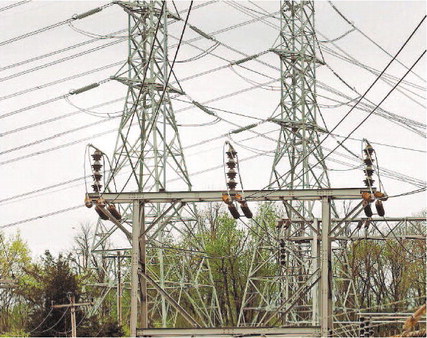 Power lines tower over the Con Edison sub station in Pleasant Valley.
Power lines tower over the Con Edison sub station in Pleasant Valley. Consumers need voice in utility-rate cases
State regulatory officials did local residents and businesses a grave disservice by approving such a steep rate increase for Central Hudson Gas & Electric Corp.
Delivery rates on both electricity and natural gas are going up, and the state Public Service Commission should have done much more to mitigate what the utility has been proposing.
This disappointing turn of events demonstrates, once again, there is a dire need for a true, independent consumer protection board in the rate-proposal process. The public must have a much stronger voice in these complicated, highstakes matters.
State Assemblyman Kevin Cahill, D-Kingston, has advocated for such an approach. He and many others support establishing a state Office of the Utility Consumer Advocate, among other changes. Other organizations, including the AARP and the local Citizens for Local Power, also have argued for an independent advocate.
Yes, the PSC accepts comments from the public and is supposedly charged with protecting the public’s interests, as is a unit of the Department of State. But the results are clearly lacking. The PSC’s recent actions regarding Central Hudson’s rate proposal clearly strengthens the argument that consumer concerns are being pushed around in what should be fair, reasonable negotiations.
Energy is not a luxury;it’s a basic necessity. And many residents, particularly the elderly on fixed incomes or those who have lost their job or who are now working for less pay in this post-recession economy, are having a hard time paying their bills.
Cahill has pointed out thestate once had several groups that were on solid ground fighting on behalf of residential and low-income ratepayers but “those important groups have been dissolved and de-funded leaving the average citizen without a voice during thisprocess.” While public sentiment was resoundingly against the increase, the PSC-approved delivery rate hikes are well above the general rates of inflation seen in Consumer Price Index reports, the Journal has reported.
The plan does include some potential benefits, including providing incentives to reduce home-service shutoffs when customers fall behind in their payments and for the utility to participate in demonstration projects aimed at increasing alternative-energy use. Citizens for Local Power also made a compelling argument that the basic, fixed monthly charge should not be raised. Customers can’t do anything, such as use less energy, to avoid those costs. This fee, now $24 a month for residential, will stay the same instead of going up by $5 as had been proposed. The local community organization Nobody Leaves Mid-Hudson also did fine work in pushing to help those struggling to pay their bills. But, overall, the approval process perpetuates an unlevel playing field – one that puts the public at a dangerous and vulnerable disadvantage. A fair fight is needed.
POUGHKEEPSIE JOURNAL

 RSS Feed
RSS Feed
